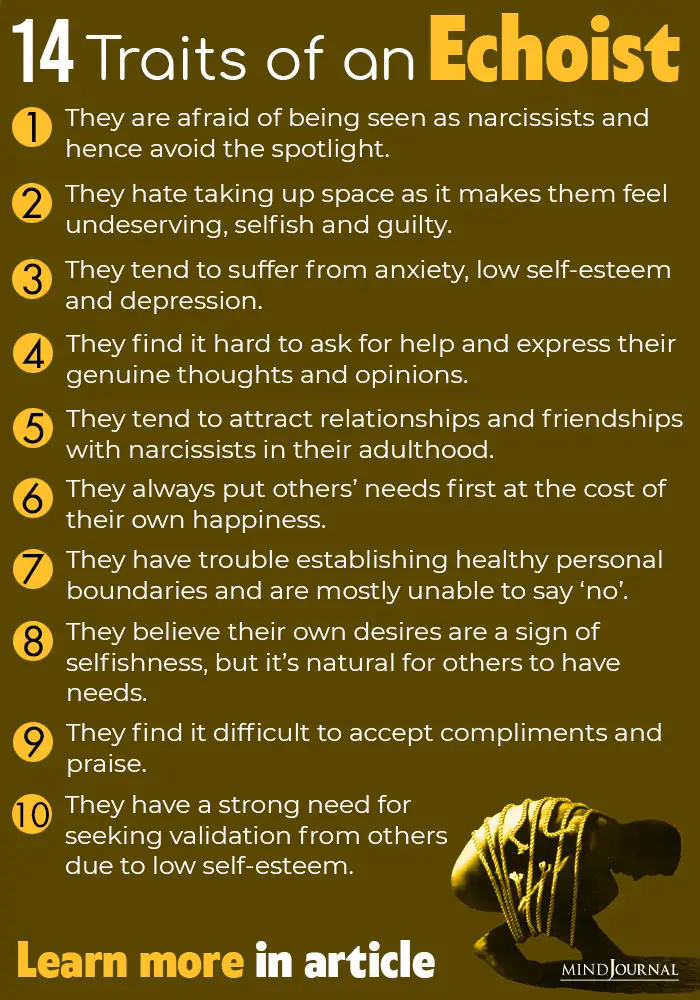What is an echoist?? Echoism is a newly coined term. An echoist is regarded as the exact opposite of a narcissist. So are you an Echoist? Let’s find out.
Are you afraid that others may think you are a narcissist? Would you rather stay silent than voice your opinions? Then you just may be an Echoist!
What is echoism? Let’s dig deeper!!
What Is An Echoist and Echoism Definition
Echoism, sometimes also known as an echo personality disorder (EPD), is a relatively new psychological concept and is regarded as a personality trait.
Individuals with this trait tend to echo the needs, desires, and emotions of others by sacrificing or overlooking their own feelings and needs. While narcissists are excessively concerned about themselves, echoists rarely think or worry about themselves.
These people often become trapped in relationships with narcissists as they don’t like to flex their own rights and prefer focusing more on their dominant partners.
People with this newly defined trait tend to be kind-hearted, benevolent, and selfless which can often be unhealthy for them.
They are prone to serving others more than necessary while gaining almost nothing in return as they hate being a burden on others and becoming the center of attention.
Considered more as a survival strategy, this trait lies at the extreme end of the spectrum used to measure narcissism.
On one end of the spectrum are people with narcissistic personality disorder (NPD), people who fall in the middle have acceptable or healthy degrees of narcissism, while on the far end are echoists who have a strong fear of being seen as narcissists.
Being modest and over-giving, they tend to attract and be vulnerable to narcissists, abusers, and other toxic personalities like psychopaths.
Clinical psychologist Perpetua Neo explains “Unfortunately, in obsessing over how not to be like the narcissist who is self-absorbed, the echoist is ironically also self-absorbed.”
Although it may seem that echoism is a fancy word for being a people-pleaser, there is, in fact, a distinct difference between the two traits.
Read also: Why Narcissistic Abuse Syndrome Is The Wrong Word For Your Condition
The term echoism was introduced and popularized by clinical psychologist and author Craig Malkin, Ph.D. in his book ‘Rethinking Narcissism’.
He claims that echoists fear feeling special or getting praise from others, regardless of how positive it may be, while narcissists thrive on being the center of attention.
It is also believed that almost all of us possess this trait to some degree, however, when such feelings become “above average” and dominate our behavior, then we can be identified as an echoist.
As we cover our base with the echoist definition, let’s take a look at the myth that’s the source of this concept.
The Myth Of Echo And Narcissus
The concept of echoism and narcissism originates from the ancient Greek myth about Narcissus and Echo.
According to the myth from Ovid’s Metamorphoses, Echo was a mountain nymph who fell in love with the overly handsome hunter Narcissus.
However, Narcissus rejected Echo’s romantic advances and eventually fell in love with his own image when he saw his reflection in a pool of water.
Narcissus later killed himself as he could not possess the object of his desire. However, Echo’s life was no less tragic.
Echo was cursed by Goddess Hera to repeat the last words ever spoken to her. When Echo fell in love with Narcissus, she could not express her love for him and silently witnessed as Narcissus fell in love with himself.
The cursed Echo could then only ‘echo’ Narcissus.

As the handsome hunter never loved her and loved only himself, the love-struck nymph mirrored his behavior and could love only Narcissus but never herself.
She eventually died from grief after being rejected. Dr. Malkin coined the term echoism based on this myth of the nymph who could never voice her feelings and only echoed others. “Like their namesake, echoists definitely struggle to have a voice of their own,” he explains.
Read also: Narcissus And Echo: The Heartbreak of Relationships With Narcissists
How Echoism The Opposite of Narcissism Develops
This coping strategy may develop during childhood, usually among children with abusive or narcissistic parents.
With years of childhood abuse, you may develop the tendency to care more about the narcissist in your life than yourself and prefer to shut your inner voice in order to survive.
As you become an adult, these coping mechanisms can become a part of your personality making you mirror the same patterns in your adult relationships.
As a result, you start to mirror and echo the needs, desires, opinions, and emotions of your partner in a romantic relationship.
During her research Donna Christina Savery, therapist and author of the book “Echoism: The Silenced Response to Narcissism,” found that most echoists tend to have a “parent with narcissism.”
However, someone may also develop such traits if they grew up with a parent who had difficulty with emotional regulation.
Children with such parents may learn to care for and support their parents at an early age, making them ignore their own needs and wants. The trait may also be rooted in comparison and competition from negative siblings or relatives.
When a child is raised in a toxic or dysfunctional family, they may desperately avoid being the center of attention and have difficulty with praise.
This can also result in unhealthy behaviors like self-sabotage. Moreover, she also observed that people with echoistic traits pursue relationships with narcissistic partners. They also tend to have what she calls an “echoistic narcissistic complex.”
Read also: 8 Adult Traits That Manifest Due To Childhood Emotional Abuse
According to Dr. Craig Malkin, echoists tend to have a higher degree of emotional sensitivity.
He believes that as they can feel deeply, they tend to develop echoism when exposed to abuse, shame, neglect, negativity, and criticism from parents or caregivers.
He believes that extreme echoists are “so afraid expressing their needs will cost them love that they lose touch with their own desires.”
Dr. Malkin believes that when parents reprimand and punish children who are “temperamentally sensitive,” especially when they seek attention and admiration, children can develop echoistic traits. “Most often, it’s narcissistic parents who push their children in this direction,” he adds.
However, Malkin claims that such personality traits are not based on passive behaviors. “Echoists can be terrific listeners, but they’re less comfortable opening up to others (their fear of becoming a burden often blocks their ability to share),” he adds.
They can be rather active in pursuing the needs of others but never bother others about their own needs. He also found that both men and women develop this trait equally, however, women may be more likely to be echoists than men.

Traits Of An Echoist
If you are wondering whether you or someone you know is an echoist, then here are some common echoist traits that can help you identify echoism:

- They are afraid of being seen as narcissists and hence avoid the spotlight. They hate taking up space as it makes them feel undeserving, selfish, and guilty.
- People with eschoistic traits tend to suffer from anxiety, low self-esteem, and depression.
- They find it hard to ask for help and express their genuine thoughts, opinions, and feelings, which can cause emotional distress.
- They tend to attract relationships and friendships with narcissists in their adulthood.
- They always put others’ needs first at the cost of their own happiness. They can go to great lengths to help and support others.
- Echoists have trouble establishing healthy personal boundaries and are mostly unable to say ‘no’.
- They believe their own needs and desires are a sign of selfishness and weakness but it’s natural for others to have needs.
- They find it difficult to accept compliments, praise, love, admiration, and care.
- They have a strong need for seeking validation and approval from others due to low self-esteem.
- They can feel intense shame and guilt for expressing anger or speaking their mind aloud.
- People with echoism tend to feel comfort and familiarity when abused and mistreated by their narcissistic partners or friends
- They are highly prone to repeated self-criticism, self-persecution, and feeling ignored or overlooked.
- They prioritize relationships more than themselves and love to make compromises and sacrifices to maintain relationships.
- They tend to be highly empathic and sensitive and can understand others’ needs easily, but fail to identify their own needs.
Read also: How Narcissistic Abuse Changes You
How Narcissism And Echoism Are Related
Although echoism and narcissism are distinct personality traits, both are related to each other. People with narcissistic personalities need someone to build their feeble ego and self-esteem. This is where echoists come in.
They are attracted to narcissists and feel happy by making the narcissistic individual feel superior to them. Echoists thrive by serving their narcissistic parents, partners, and others, while the narcissist needs the echoist to feed their ego.
This is a match made in a distorted “bizarro” heaven that leads to the creation of an unhealthy relationship riddled with abuse, blame, and manipulation. Narcissists love blaming echoists for their flaws which affects their self-esteem further.
Craig Malkin Ph.D. explains “echoists are often drawn to narcissists precisely because they’re so afraid of burdening others or seeming ‘needy’ that to have someone who relishes taking up all the room, as narcissists often do, comes as something of a relief; but it’s a high price to pay for a respite from their anxieties.”
Echoists are more vulnerable to narcissistic abuse and are prone to blaming themselves for any toxic behavior they receive from the narcissist. They may feel that they are being too needy or overly sensitive or have unrealistic expectations from the relationship.
Despite their false beliefs, a person with echoism, or anyone for that matter, doesn’t deserve to be abused. It is never their fault. However, “echoists can mire themselves in abusive relationships because they feel responsible for their mistreatment,” adds Dr. Malkin.
Read also: The Empath and The Narcissist: The Brutal Reality Of Their Toxic Relationship

How Does Echoism Affect You?
There are more drawbacks to being an echoist than benefits. As most people with echoism tend to utilize this trait as a survival mechanism to avoid anxiety, it may lead to some degree of relief in them.
By avoiding the spotlight and attention they may feel they are not being a burden on anyone. However, this makes them susceptible to narcissistic abuse from parents and partners.
Not only does it make them unable to take charge of their own life and feel independent, but it can also make them a puppet at the hands of the narcissist. Moreover, echoists are unable to feel special or accept praise.
Studies show that feeling special and understood is associated with “greater life satisfaction” and “daily well-being.” As echoists are unable to experience such positive emotions, they are more prone to anxiety and depression.
It also affects their ability to overcome obstacles, pursue dreams, and their longevity. Moreover, echoists are also prone to deliberately being an underachiever in life, whether in education, career, or relationships.
Author Peg Streep believes that “the extreme echoist doesn’t want to be noticed; she’s much more comfortable hiding in the shadows where it’s safe, and what better way to do that than to underachieve?”
Read also: Anxiety Disorders Could Be Caused By Being Exposed To Narcissistic Abuse
According to Dr. Malkin, when he scribbled the term “echoism” on a piece of paper, he realized that the myth of Echo and Narcissus focuses on both ends of the narcissism spectrum – “the dangers of an addiction to feeling special and the inability to enjoy feeling special at all. Everyone forgets about Echo in the myth, and that made the term seem all the more apt.”
However, it should be noted that echoists are not necessarily completely docile and submissive creatures. People with echoism may feel driven to avoid being a burden on others, but they can react negatively and angrily when forced to be in the spotlight. “Echoists hate attention,” explains author and psychologist Kerry McAvoy, PhD.
When they are compelled to become the center of attention, like a surprise birthday party, they can get bitter and furious. Hence, they are also prone to uncontrollable mood swings.
Distress with accepting praise, discomfort with expressing self, and excessive people-pleasing behavior can cause several other mental and emotional health issues in the long run.
However, unlike narcissistic personality disorder (NPD), echoism or echo personality disorder (EPD) is not a clinical diagnosis.
It is not a mental health condition that can be treated. Currently, psychologists and psychotherapists are trying to better understand this personality trait.
Echoism And Relationships
People with echoistic traits tend to feel things deeply. Growing up around narcissistic and abusive parents they learn to suppress their emotions and silence their voices to avoid any negative reactions.
Hence, as adults, they believe taking up as little space as required in relationships can make life easier and better for them. Driven by the fear of being seen as a narcissist, they become accommodating in romantic relationships.
Unfortunately, as they are filled with self-doubt, anxiety, self-criticism, lack of self-expression, and echoistic thoughts, they can quickly make even a healthy relationship toxic. Relationships can be even worse when they become prey to narcissists.
They can cater unrelentingly to (emotionally) needy, and sometimes emotionally unavailable, parents, partners, and friends. In adulthood, women with such tendencies become trapped in one-sided romantic relationships and friendships.
They can constantly give attention and praise to their partners but may become hostile when similar behaviors are reciprocated by their partners. As a result, they mostly develop unhealthy attachment patterns and styles.
Read also: The Attachment Theory: How Childhood Attachment Affects Adult Relationships

Overcoming Echoism
Echo personality disorder (EPD) mainly stems from abuse, unhealthy attachment patterns, and insecurity during childhood.
This is why it is crucial that echoists learn how to boost their self-esteem if they wish to build healthier relationships and lives. You need to start accepting yourself, show love and compassion to yourself first, and allow yourself to receive love, admiration, and appreciation from others.
You also need to learn how to express yourself and take a stand on what you think is important. Having a healthy mindset and personality requires that you possess both narcissistic and echoistic qualities to some degree. You need to remind yourself that you deserve to be happy and you are worthy.
Believing that you’re overly sensitive or blaming yourself every time anything goes wrong in a relationship will not help you cope with this particular personality trait.
What you need to do is learn how to share difficult emotions with trusted loved ones. Dr. Malkin explains “Being able to have a vulnerable way to share those feelings instead of blaming yourself – that’s what helps people overcome echoism.”
As it is a trait and not a diagnosis, you can take some steps to get over echoism and learn how to be a mix of both a healthy narcissist and an echoist. While healthy narcissism can teach you to love yourself, healthy echoistic traits can enable you to be empathic and sensitive toward others. Here are a few things you can do to heal:
1. Identify echoism
The first step towards healing yourself begins with awareness. Learn to recognize echoistic behaviors and patterns that you may exhibit and take note of them. Identify the triggers and understand why you may behave the way you do. Once you become aware of such patterns you will be able to address them.
2. Focus on your strengths
All of us have certain flaws and imperfections. That’s what makes us human. But we also have certain strengths and abilities which make us unique and special.
And whether you admit it or not, you also possess certain unique traits that make you stand out from others. So instead of trying to hide, acknowledge your abilities and learn to take compliments and praise from others.
If you have a hard time identifying what makes you special, then pay attention to what others praise in you and what they like about you.
3. Establish strong, healthy boundaries
Setting up and asserting personal boundaries is hard for most of us but it is more important than you can realize.
Boundaries are not about keeping others away but more about protecting yourself. Learn to say ‘no’ when you want to in a respectable and graceful manner. Boundaries keep you safe and allow you to connect with others on your terms.
Read also: The First (and hardest) Step To Healing From Narcissistic Abuse

4. No more self-bashing
Enough with all the self-deprecating, self-hatred, self-blame, and self-criticism. Yes, we all make mistakes but blaming yourself constantly will not solve anything. It will only make you feel exhausted, overwhelmed, and isolated.
This is why it is crucial that you learn to silence your inner critic and ignore the negative self-talk no matter how loud it screams at you. If the negative inner voice becomes too strong, try to pause, practice self-compassion, and use facts and logic to counter negative thoughts and emotions.
Caring about yourself is not a crime. According to Dr. Malkin “Self-blame is an action, not a feeling.” echoists do it to hide their disappointment and avoid being seen as needy. “When you start blaming yourself after a bad interaction, ask yourself – did I really do something so wrong?” he suggests.
5. Acknowledge & express your emotions
One of the worst habits you develop from echoism is suppressing and ignoring your emotions and needs.
This tendency of avoiding your feelings and desires leads to self-blame which makes it worse. Instead of hiding your feelings, try to identify and accept your emotions no matter how difficult it may be. It is also important that you learn to share your emotions, dreams, and desires with others. Although it may take some time and effort, you will get there with determination and patience.

6. Overcome the trauma
Echoism is primarily fueled by early trauma and adverse childhood experiences (ACE) that cause unhealthy thought and behavior patterns.
Over a period of time, being an echoist can make you suffer from a number of mental health conditions, such as depression, which can worsen due to your childhood trauma. Hence, it is best to see a therapist or a healthcare professional to overcome the trauma and learn healthy coping strategies to live a better, healthier life.
Read also: 3 Ways To Handle Childhood Trauma
7. Build healthier relationships
As echoists are often attracted to narcissists, it is likely that you are either stuck in an unhealthy relationship or have your fair share of toxic exes.
However, it is important that now you take the right steps to move away from unhealthy attachment patterns and toxic relationships. This will enable you to express your opinions and build your own personal identity.
Being in toxic relationships can keep you trapped in the echoism loop. So either try to change the relationship dynamic or simply walk away if you feel the relationship or friendship is too damaged for repair. Stop denying yourself the right to experience a healthy, loving relationship.
Balance Echoism And Narcissism
One of the worst things we can do to ourselves is build an image of ourselves in our minds and alter our personality, identity, behaviors, and life to fit that image.
This is perhaps the biggest problem with echoists. As they don’t want others to perceive them as narcissists, they make unnecessary sacrifices at the cost of their own happiness. What you need to realize is that a thought is just that… a thought. It’s not a fact. Don’t make it your reality.

“You do actually have a voice, you’ve just learned to silence it. And some people may even love to hear it,” says Craig Malkin, Ph.D.
Instead of avoiding yourself to hold up your image of not being a narcissist, bring some balance into your life.
Add a healthy dose of narcissism and self-love to counter your echoism. This will help to boost your confidence and self-esteem.
Express yourself. Fulfill your needs. Love yourself. Manifest happiness.
Did you find this blog on “What Is An Echoist?” insightful? Don’t forget to share your comments below!
Read also: What Is Healthy Narcissism? How Does it Differ from Self Love











Leave a Reply
You must be logged in to post a comment.